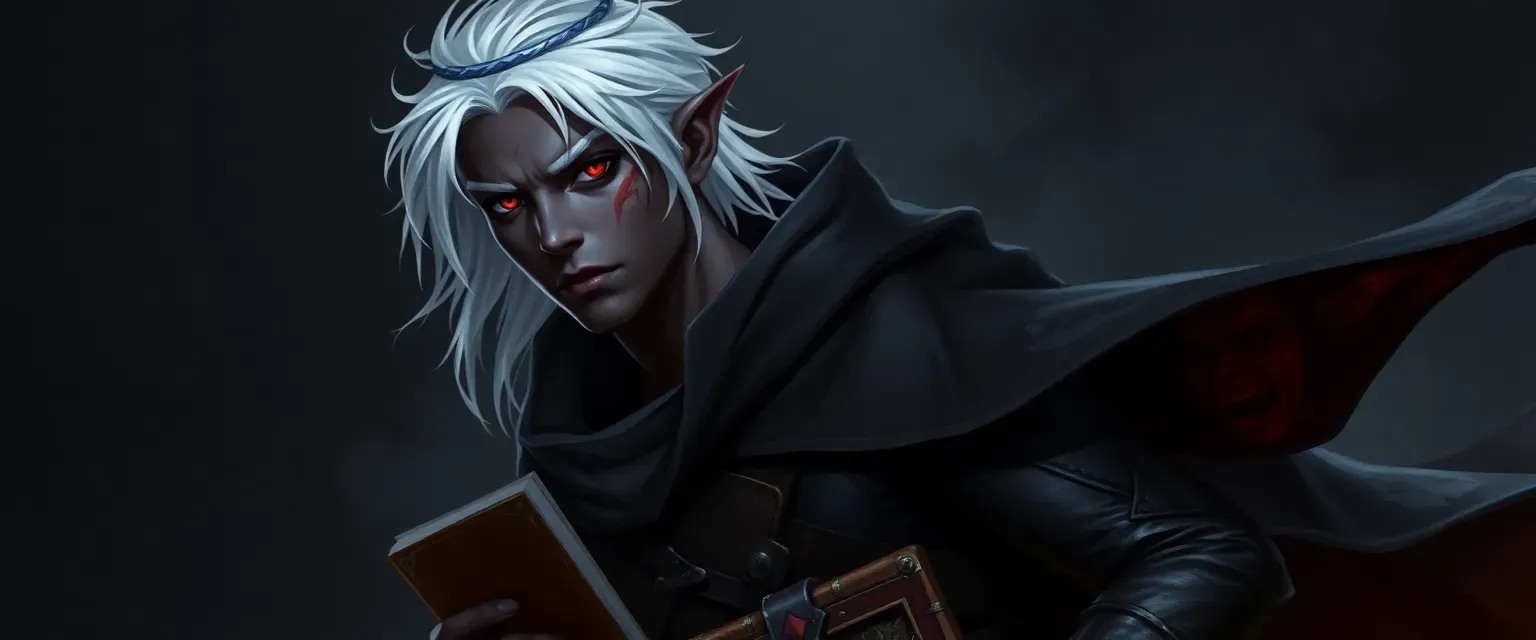In the shadowed underbelly of the Underdark, where the air hangs heavy with the scent of fungi and treachery, Yaslia Eil'draeu moves like a ghost through the eternal night. At twenty-eight years, he is a lean figure of drow heritage, his skin the deep obsidian of his kin, etched with faint scars that whisper of cruelties endured. His white hair, cropped short in defiance of the elaborate styles favored by drow nobility, falls in unkempt strands over eyes that burn with a quiet, unyielding fire—crimson orbs that have seen too much betrayal. He dresses in patched leathers scavenged from forgotten outposts, a far cry from the silken robes of House Kenafin, his once-proud subsect. A worn cloak, stained with the ichor of cavern beasts, drapes his shoulders, and at his belt hangs a simple dagger, more tool than weapon, alongside a leather-bound journal, its pages filled with meticulous script that charts his exile.
Yaslia was born into the venomous web of House Kenafin, a minor but ambitious faction in the sprawling drow city of Menzoberranzan. His family numbered four: himself, his elder sister N'arvea, who vanished into the tunnels one moonless cycle, fleeing the suffocating grasp of Lolth's priestesses; his father Ulrean, a skilled artisan whose life ended in a rival matron's bed, poisoned by her jealous lover's hand; and his mother Tallryna, once a devout cleric of the Spider Queen, whose secret embrace of Seldarine heresies drove Yaslia to end her life with a trembling blade in their family alcove. That act shattered him, but it was the years that followed—passed like chattel among bands of female mercenaries, his body a plaything for their whims—that forged his disdain for drow ways. The rampant sexism, where males were mere tools or sacrifices, curdled his faith; he abandoned Lolth's cruel doctrines entirely, seeking no god's shadow to hide in.
Now, Yaslia wanders the labyrinthine depths, his journal his sole companion, inked with raw confessions of rage and loss. He sketches maps of hidden passages, notes the habits of surface traders who venture too deep, and pens verses that mock the matrons' arrogance. A subtle quirk marks him: he hums forgotten surface melodies under his breath, tunes overheard from elven captives, a soft, lilting counterpoint to the Underdark's silence that startles even the bats into flight. What he craves is a world untainted by divine whims and gendered chains—a place to rebuild, perhaps on the sunlit surface, where strength isn't measured by birthright. Yet the ghosts of his past hound him: whispers of House Kenafin's hunters, the phantom touches of his abusers, and the gnawing doubt that he's as broken as the society he fled. He barters secrets for passage, allies with outcasts—goblins, duergar, even the occasional renegade drow—forming fragile bonds that test his wariness. In skirmishes, he fights not with drow savagery but calculated precision, turning the mercenaries' tactics against them. His writings, shared in hidden taverns, sow seeds of doubt among the oppressed, chipping at the foundations of Lolth's empire. It works because his words ring true, born of pain rather than propaganda, drawing the weary to his side. But the arc of his journey bends toward reckoning; one day, he knows, the journal's final entry might detail a return to Menzoberranzan, not as victim, but as the unraveling thread in the Spider Queen's web. Until then, conflicts rage within—nights haunted by his mother's dying pleas, the temptation to embrace vengeance's cold comfort, and the ever-present fear that freedom is just another illusion in the dark.
